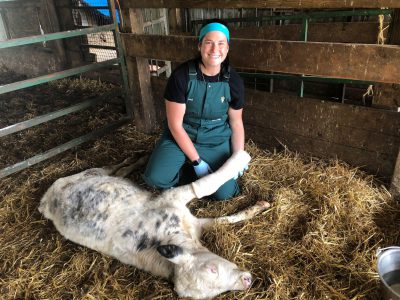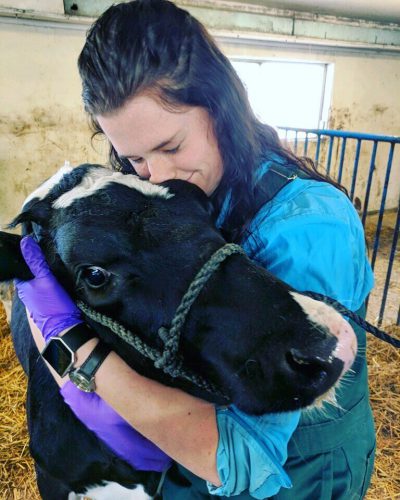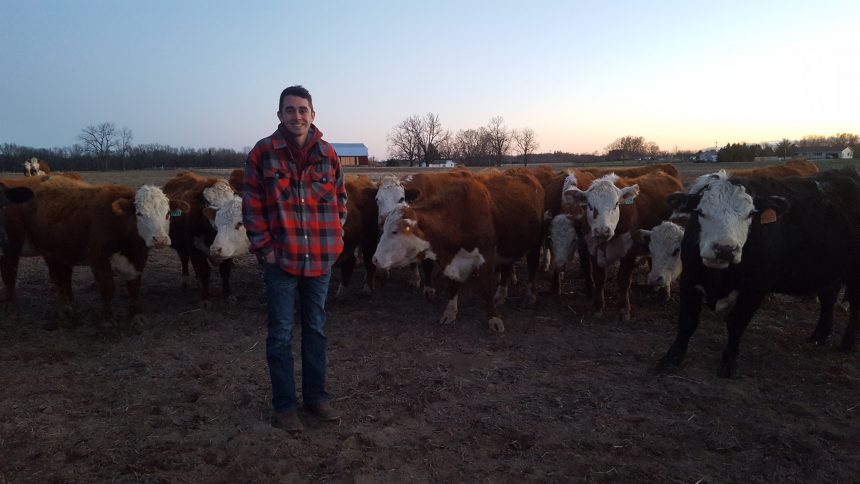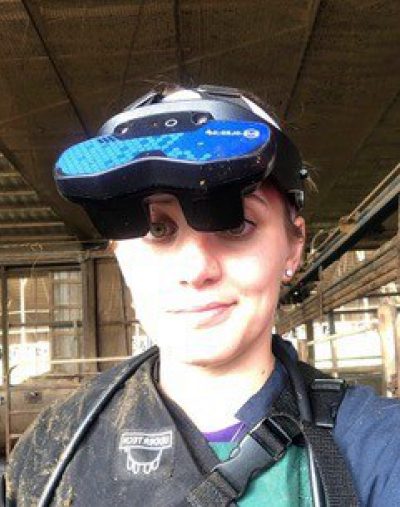Three fourth-year veterinary medical students from the Michigan State University College of Veterinary Medicine—Dena Letot, Kyle Longcore, and Katie Osborne—have been awarded scholarships by the American Association of Bovine Practitioners (AABP).
“It’s a huge accomplishment and well-deserved attention for our students,” says Ángel Abuelo, assistant professor of Cattle Health and Wellbeing for the College’s Department of Large Animal Clinical Sciences. “These scholarships speak to their expertise, interests, and potential as future production animal veterinarians.”
Congratulations, award winners!
Dena Letot

Dena Letot, DVM Class of 2021, was awarded the AABP Bovine Veterinary Student Recognition Award. Dena first became interested in working with cows during her second year of undergraduate college, when she shadowed a veterinarian in her hometown. Letot learned about palpation techniques and health assessment. Since that initial experience, Letot sought out and shadowed many other large animal veterinarians who offered her valuable hands-on learning experiences. She assisted in herd checks and pregnancy palpations, administered oral and injectable medications, performed venipuncture and radiography on multiple large animal species, and even assisted in surgeries like displaced abomasum repairs, various castration procedures, and goat cryptorchid surgery.
“I did not grow up on a farm or showing farm animals in 4-H, but even without an early start, I found my love of food animals,” says Letot.
Letot earned two bachelor of science degrees—one in biological and integrated science and another in zoology with a concentration in ecology, evolution, and organismal biology—and a teaching certificate in secondary education for science from Michigan State University. Now, at veterinary school, Letot hopes to focus on field surgery techniques, as well as anesthesia and analgesia to help improve animal welfare and milk quality for increased food safety, farm productivity, and cow comfort.
“Immediately following graduation, I hope to work as a food animal veterinarian in the rural areas of midwest Michigan,” says Letot. “I wish to serve areas that are in need of veterinarians, but may not be able to offer an equivalent monetary reward. It will be a challenge, but as the daughter of a teacher and as a previous teacher myself, I have grown up knowing that pay is not what makes a job worth doing. I have worked with veterinarians in such rural areas, and the level of gratitude from small family farms is unmatched and makes me proud to be a part of this profession.”
In addition to clinical practice, Letot sees importance in improving public perception of food animals and how the products people gain from them are used.
“I believe that by working in a rural general practice, I can act as a liaison between farms and the community to build such awareness,” says Letot. “By visiting local classrooms and holding seminars for the community, I can encourage transparency and open communication about what life on a farm is truly like. I hope to convey the importance of the agricultural industry in our daily lives and inspire young students to explore the industry as well.”
Clinical practice and community education will not be the last stops of Letot’s career. She plans to return to academia and teach collegiate-level veterinary students about food animal medicine and the agricultural industry.
“By first focusing on strengthening my skills and knowledge as a general practitioner, I believe I can then use my teaching certification to prepare the next generation of veterinarians,” says Letot. “I guess my classmates even agree, since they voted me ‘Most Likely to Become a Professor!’”

Letot, who has especially high student debt, plans to put all her award winnings toward her education.
“I did not get accepted to vet school the first time I applied, and decided to pursue my teaching credentials in the interim,” says Letot. “As rewarding as it was to work with middle school students, the end result was an extra three years of education and college debt. With two other college-aged siblings, financial support from my family was already not an option. Then, during my junior year of college, my dad passed away. It was devastating and unexpected, and I didn’t fully realize until later how much of an impact it had, and still has, on my life.
“My mom was suddenly a single parent to three college students pursuing higher education and she couldn’t help us alone on her teacher’s salary,” Letot continues. “That being said, veterinary medicine has always been my passion and I wanted to do everything I could to pursue it. I have worked multiple jobs, taken out loans, applied to scholarships, lived in community housing, and enjoy a daily two-hour commute to school to ensure that I am not hindered by finances. This scholarship will allow me to take out fewer loans and reduce my future financial burden. I hope that with less of a burden weighing on me at graduation, I can be free to take a job in an underserved area where I can give back to the community, rather than having to think of my finances first.”
Kyle Longcore
Kyle Longcore, DVM Class of 2021, was awarded the AABP Foundation—Zoetis Scholarship. Longcore was born and grew up on a cow-calf beef farm in Cedar Springs, Michigan, where he helped raise Hereford and Simmental cattle with his father.
“I took an interest in the farm at a young age and soon had many responsibilities,” says Longcore. “By the time I entered high school, I had a strong sense of ownership of the farm, and my dad and I made all farm decisions together. Our main goal is to produce the best seedstock genetics we can, and we strive to utilize the most progressive management practices to achieve that goal.

“On our farm, we also try to be as self-sufficient as possible in regard to our cattle’s health,” continues Longcore. “I castrate, dehorn, vaccinate, conduct pregnancy checks, and handle the vast majority of dystocias. Because of what I learned in my undergraduate animal science education, I have worked to implement better rotational grazing, cover crop utilization, and better nutritional plans for our developing heifers. Throughout vet school, I have carried on as the co-manager of the farm from a distance, driving home every weekend to chip-in on chores, troubleshoot problems, and complete any manual labor projects too strenuous for my old man to do.”
After veterinary school, Longcore intends to become a large animal private practice veterinarian in the West Michigan area. He is especially interested in embryo transfer and dairy parlor management. He also plans to continue managing his family’s farm.
“When considering my career path, I cannot be more grateful for my upbringing on a farm,” says Longcore. “I can honestly say that beef cattle are my true passion. It’s my only hobby and I work my butt off at it. It’s what started me down this crazy road of vet-med and it’s something I plan on doing for all time.
“I just want to be a successful, respectable large animal practitioner,” continues Longcore. “I would like to someday own a partnership stake in a practice. I hope to form many long-lasting relationships with my clients and my peers. If you’re respected, it means that you’re competent and humble, and those are the only two things a great vet truly needs to be.”
For Longcore, his scholarship award validates all the hard work he’s put into bovine management and medicine.
“That dedication being recognized is a very gratifying experience,” says Longcore. “It also is a huge financial support. I’d like to pay off my student loans someday before I die, and this scholarship gets me one step closer to achieving that.”
Katie Osborne

Katie Osborne, DVM Class of 2021, was awarded the AABP Foundation—Zoetis Scholarship. Osborne’s entire life has revolved around food animal production medicine.
“My mom and I operated a 100-head registered Holstein farm in central Pennsylvania, where I spent time taking care of the calves, milking the cows, and AI breeding, as well as managing health and calving records,” says Osborne. “I have also been the shot-gun rider in my father’s vet truck since I was three years old. At the beginning, I was just an observer from the straw bale play pen—until I figured out ways to get out of it and poke the displaced abomasum when my dad wasn’t looking. Since then, I gradually got promoted to more veterinary-specific tasks, such as palpating alongside him for routine herd checks, administering vaccines, dehorning calves, and assisting with displaced abomasum surgeries.”
Osborne earned a bachelor of science degree from Wake Forest University. After graduating from veterinary school, she plans to go into predominantly dairy practice.
“I’m focused on finding good mentorship to feed my passion for reproductive work, mastitis prevention, and employee education,” says Osborne.
Osborne’s ultimate career goals include involvement with the dairy industry, working with farmers to produce high-quality products for consumers, growing the future of agriculture, and, most importantly, being the bovine vet she’s always wanted to become.
“This scholarship means that I have been recognized by my future colleagues and peers as someone who has worked hard to get to where I am and have the potential to make an impact in my career,” says Osborne. “It means more than I can say.”
